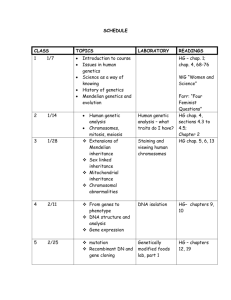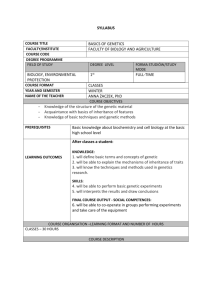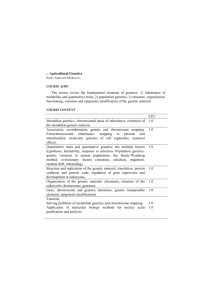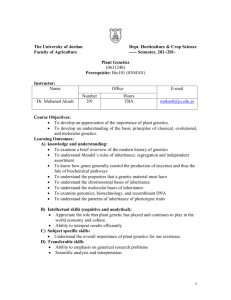Course Title: Biological Principles I (BIOL 2107)
advertisement
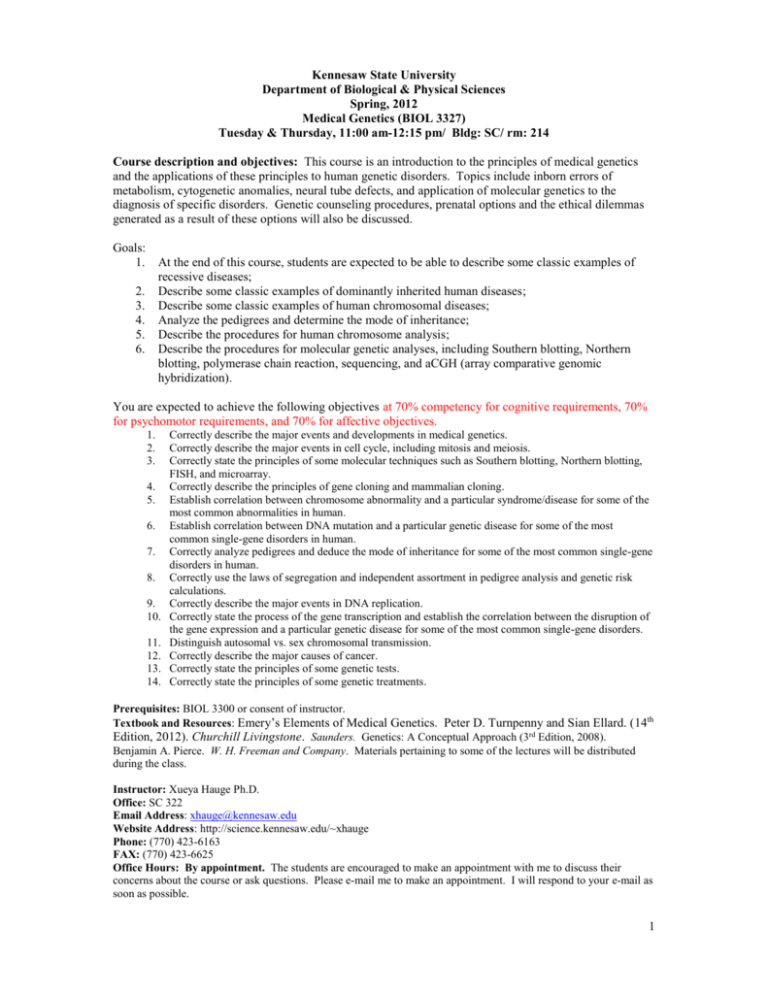
Kennesaw State University Department of Biological & Physical Sciences Spring, 2012 Medical Genetics (BIOL 3327) Tuesday & Thursday, 11:00 am-12:15 pm/ Bldg: SC/ rm: 214 Course description and objectives: This course is an introduction to the principles of medical genetics and the applications of these principles to human genetic disorders. Topics include inborn errors of metabolism, cytogenetic anomalies, neural tube defects, and application of molecular genetics to the diagnosis of specific disorders. Genetic counseling procedures, prenatal options and the ethical dilemmas generated as a result of these options will also be discussed. Goals: 1. At the end of this course, students are expected to be able to describe some classic examples of recessive diseases; 2. Describe some classic examples of dominantly inherited human diseases; 3. Describe some classic examples of human chromosomal diseases; 4. Analyze the pedigrees and determine the mode of inheritance; 5. Describe the procedures for human chromosome analysis; 6. Describe the procedures for molecular genetic analyses, including Southern blotting, Northern blotting, polymerase chain reaction, sequencing, and aCGH (array comparative genomic hybridization). You are expected to achieve the following objectives at 70% competency for cognitive requirements, 70% for psychomotor requirements, and 70% for affective objectives. 1. 2. 3. 4. 5. 6. 7. 8. 9. 10. 11. 12. 13. 14. Correctly describe the major events and developments in medical genetics. Correctly describe the major events in cell cycle, including mitosis and meiosis. Correctly state the principles of some molecular techniques such as Southern blotting, Northern blotting, FISH, and microarray. Correctly describe the principles of gene cloning and mammalian cloning. Establish correlation between chromosome abnormality and a particular syndrome/disease for some of the most common abnormalities in human. Establish correlation between DNA mutation and a particular genetic disease for some of the most common single-gene disorders in human. Correctly analyze pedigrees and deduce the mode of inheritance for some of the most common single-gene disorders in human. Correctly use the laws of segregation and independent assortment in pedigree analysis and genetic risk calculations. Correctly describe the major events in DNA replication. Correctly state the process of the gene transcription and establish the correlation between the disruption of the gene expression and a particular genetic disease for some of the most common single-gene disorders. Distinguish autosomal vs. sex chromosomal transmission. Correctly describe the major causes of cancer. Correctly state the principles of some genetic tests. Correctly state the principles of some genetic treatments. Prerequisites: BIOL 3300 or consent of instructor. Textbook and Resources: Emery’s Elements of Medical Genetics. Peter D. Turnpenny and Sian Ellard. (14th Edition, 2012). Churchill Livingstone. Saunders. Genetics: A Conceptual Approach (3rd Edition, 2008). Benjamin A. Pierce. W. H. Freeman and Company. Materials pertaining to some of the lectures will be distributed during the class. Instructor: Xueya Hauge Ph.D. Office: SC 322 Email Address: xhauge@kennesaw.edu Website Address: http://science.kennesaw.edu/~xhauge Phone: (770) 423-6163 FAX: (770) 423-6625 Office Hours: By appointment. The students are encouraged to make an appointment with me to discuss their concerns about the course or ask questions. Please e-mail me to make an appointment. I will respond to your e-mail as soon as possible. 1 Course Attendance Policy: Lecture attendance is essential for success in this class. You are responsible for all lecture materials and any announcements made in class. Exam Policy: Make-up exams will be given only to students who have excuses, including illness and accidents. You must get a prior approval from the instructor before you can take make-up exams. In case of illness, you must hand in a copy of your doctor’s note to the instructor. Withdraw Policy: The last day to withdraw without academic penalty is March 12, 2012. Enrolment Policy: Only those students who are enrolled in the class may attend lectures, receive assignments, take quizzes and exams, and receive a grade in the class. If a student is administratively withdrawn from this course, they will not be permitted to attend class nor will receive any grade for the class. Lecture Grading: There will be three exams and one assignment during the course. The assignment, producing a brochure or making an oral presentation for a genetic disease, is worth 50 points. Summary of the lecture scores: First exam 100 points Second exam 100 points Final exam 150 points Assignments 50 points Total 400 points Grade Evaluation: A 90-100%; B 80-89%; C 70-79%; D 60-69%; F 0-59% Academic Integrity: All students are expected to follow the Academic Integrity Policy of Kennesaw State University. Tentative Class Schedules: Subject to change WEEK Jan. 10: Jan. 12: Jan. 17: Jan. 19: Jan. 24: Jan. 26: Jan. 31: Feb. 2: Feb. 7: Feb. 9: Feb. 14: Feb. 16: Feb. 21: Feb. 23: Feb. 28: Mar. 1: Mar. 6: Mar. 8: Mar. 13: Mar. 15: Mar. 20: Mar. 22: Mar. 24: Mar. 27: Mar. 29: Apr. 3: Apr. 5: Apr. 10: Apr. 12: Apr. 17: Apr. 19: Apr. 24: Apr. 26: May 1: TOPICS (CHAPTER IN YOUR TEXTBOOK) Introduction/pre-lecture test Introduction to Medical Genetics The cellular and molecular basis of inheritance (2) The cellular and molecular basis of inheritance (cont.) The cellular and molecular basis of inheritance (cont.) Chromosomes and cell division (3) Chromosomes and cell division (cont.) DNA technology and application (4) DNA technology and application (cont.). DNA technology and application (cont.)/ Review for Exam I Exam I Principles of clinical cytogenetics Chromosome disorders (18). Chromosome disorders (cont.) Pattern of inheritance (7) Patterns of inheritance (cont.) Spring Break, No Class Scheduled Spring Break, No Class Scheduled Pattern of inheritance: Genetic imprinting Single gene disorders (19) Population and mathematical genetics (8) Prenatal testing and reproductive genetics (21) Prenatal testing and reproductive genetics (cont.) Exam II Mapping and identification genes for monogenic disorders (5) Cancer genetics (14) Cancer genetics (cont.). The treatment of genetic disease (23) student presentations student presentations student presentations student presentations student presentations/course evaluation Final Exam 10:30 am -12:30 pm Special Dates: Withdraw: The last day to withdraw without academic penalty is March 12, 2012. 2 Final Exam: May 1st (10:30 am-12:30pm) 3
